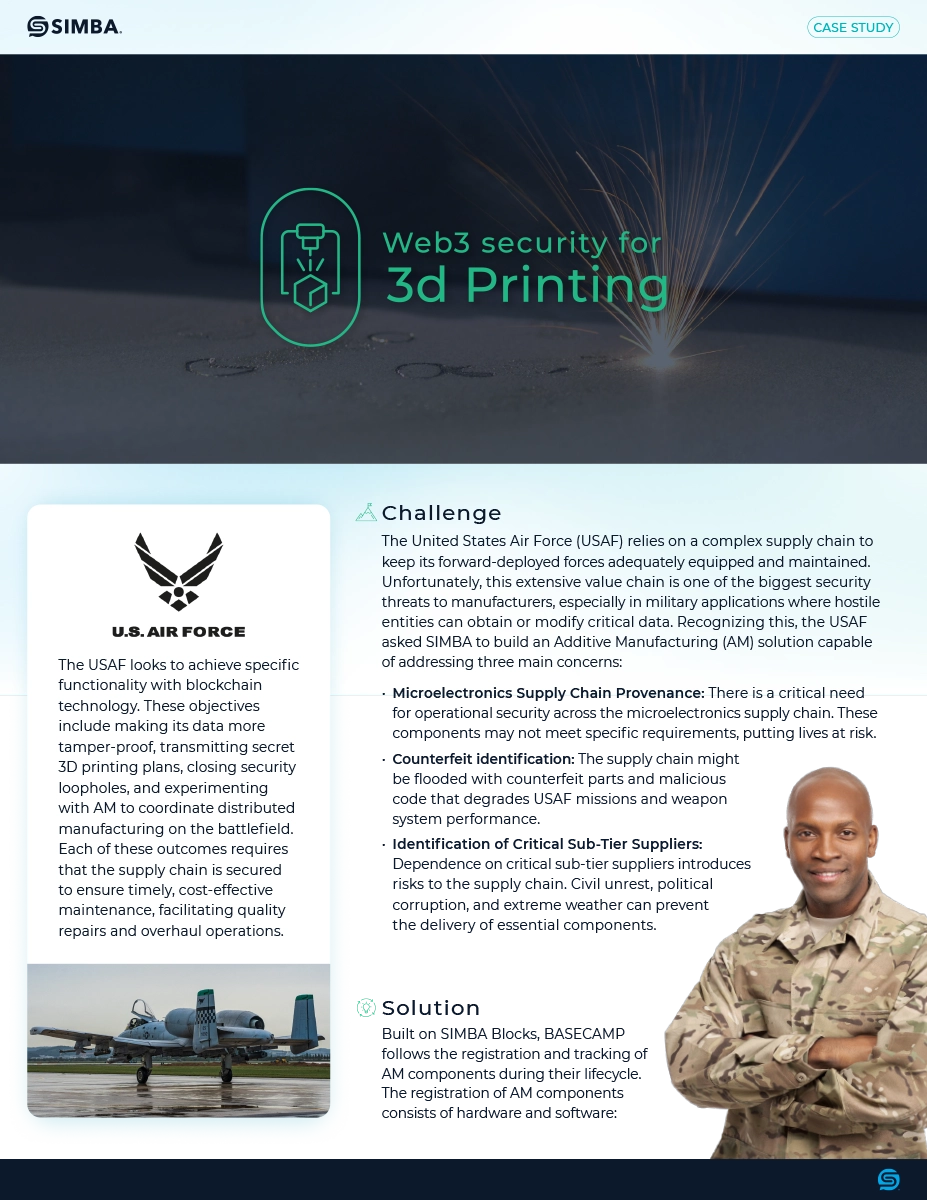Web3 Security for Additive Manufacturing
The USAF looks to achieve specific functionality with blockchain technology. These objectives include making its data more tamper-proof, transmitting secret 3D printing plans, closing security loopholes, and experimenting with AM to coordinate distributed manufacturing on the battlefield. Each of these outcomes requires that the supply chain is secured to ensure timely, cost-effective maintenance, facilitating quality repairs and overhaul operations.
Challenge
The United States Air Force (USAF) relies on a complex supply chain to keep its forward-deployed forces adequately equipped and maintained. Unfortunately, this extensive value chain is one of the biggest security threats to manufacturers, especially in military applications where hostile entities can obtain or modify critical data. Recognizing this, the USAF asked SIMBA to build an Additive Manufacturing (AM) solution capable of addressing three main concerns:
- Microelectronics Supply Chain Provenance: There is a critical need for operational security across the microelectronics supply chain. These components may not meet specific requirements, putting lives at risk.
- Counterfeit identification: The supply chain might be flooded with counterfeit parts and malicious code that degrades USAF missions and weapon system performance.
- Identification of Critical Sub-Tier Suppliers: Dependence on critical sub-tier suppliers introduces risks to the supply chain. Civil unrest, political corruption, and extreme weather can prevent the delivery of essential components.
Solution
Built on SIMBA Blocks, BASECAMP follows the registration and tracking of AM components during their lifecycle. The registration of AM components consists of hardware and software:
- For hardware, a barcode is inserted into the 3D printer during manufacturing.
- For software, the hardware identifier, design files, and other metadata are recorded to the blockchain and data stores.
- Smart contracts manage authorizations and notify key stakeholders of changes to the desk files.
Results
Following BASECAMP implementation, SIMBA Chain helped teams reduce non-conformance tracking from 2000 labor hours to 20 — a 99% reduction. Instead of executing queries across disjointed data, teams could conduct a single query to get information immediately.
Challenge
The United States Air Force (USAF) relies on a complex supply chain to keep its forward-deployed forces adequately equipped and maintained. Unfortunately, this extensive value chain is one of the biggest security threats to manufacturers, especially in military applications where hostile entities can obtain or modify critical data. Recognizing this, the USAF asked SIMBA to build an Additive Manufacturing (AM) solution capable of addressing three main concerns:
- Microelectronics Supply Chain Provenance: There is a critical need for operational security across the microelectronics supply chain. These components may not meet specific requirements, putting lives at risk.
- Counterfeit identification: The supply chain might be flooded with counterfeit parts and malicious code that degrades USAF missions and weapon system performance.
- Identification of Critical Sub-Tier Suppliers: Dependence on critical sub-tier suppliers introduces risks to the supply chain. Civil unrest, political corruption, and extreme weather can prevent the delivery of essential components.
Solution
Built on SIMBA Blocks, BASECAMP follows the registration and tracking of AM components during their lifecycle. The registration of AM components consists of hardware and software:
- For hardware, a barcode is inserted into the 3D printer during manufacturing.
- For software, the hardware identifier, design files, and other metadata are recorded to the blockchain and data stores.
- Smart contracts manage authorizations and notify key stakeholders of changes to the desk files.
Results
Following BASECAMP implementation, SIMBA Chain helped teams reduce non-conformance tracking from 2000 labor hours to 20 — a 99% reduction. Instead of executing queries across disjointed data, teams could conduct a single query to get information immediately.
The U.S. Air Force commissioned SIMBA Chain to assist with its Additive Manufacturing (AM) efforts at home and on the battlefield. In partnership with SIMBA, the Air Force’s BASECAMP project decentralizes AM in the field while maintaining data integrity. The platform achieves this functionality by delivering key features:
- Accurate: Provides a non-repudiable way of registering repairs to battle damaged AM components.
- Simple: Provides unique registration of each component using the hardware identifier.
- Authenticated: Stores original design files so that the authenticity of that design is established at its creation.
- Tamper Free: Allows for inspection of potential assaults along the supply chain through tracking each stage (creation, installation, modification, etc.)
Following SIMBA’s win at the Additive Manufacturing Olympics, CEO Bryan Ritchie spoke on the company’s unique value proposition for military applications.
“Security is crucial to any supply chain, especially for fast-changing military operations. SIMBA harnesses the potential of blockchain technology to deliver supply chain solutions that enable immutable record keeping, enhanced security, and unmatched transparency. In addition, military stakeholders benefit from SIMBA’s low configuration environment, accelerating the implementation of initiatives like securely interconnected additive manufacturing.”
